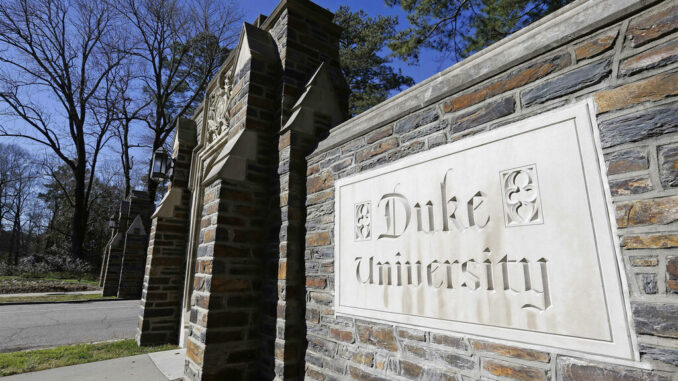
When people talk about public education in the state of North Carolina, the first thing they discuss is teacher pay.
College administrators and faculty say a lot of their problems regarding diversity and inclusion could be solved if high school students of all races were better prepared academically. Liberal faculty members are always first in line to “demand” the Republican-controlled legislature pay elementary and secondary education teachers much higher salaries and provide better books, high-speed internet access and science labs.
The Leandro decision “directed” the legislature ― unconstitutionally and a violation of the separation of judicial powers from legislative responsibilities ― to spend well over $1 billion around the state in installments to bring all schools up to par in terms of delivering high-quality public education to every student.
However, in a curious and almost hypocritical manner, there is one major impediment to local governments having the financial resources to improve public schools today: institutions of higher education such as Duke, Wake Forest, UNC-Chapel Hill and NC State.
Property taxes are the primary way local governments pay for municipal or county responsibilities. Local governments pay a large share of public education expenses including teacher salaries.
Universities and colleges don’t pay any property tax at all. They are tax-exempt. Out of the 171 public and private colleges and universities in North Carolina ― not one of them pays a single dime in local property taxes to support public education and pay teacher salaries.
Many of these institutions own hotels and golf courses which should be subject to property taxation just like any other commercial enterprise in the county. Duke University owns over 7,000 acres of prime real estate in Duke Forest, none of which is subject to city or county property taxation.
Duke University owns 172 parcels of property in Durham County, all of which is exempted from taxation by the city or county. One property, 1500 West Main St., is valued at $29,471,700. If taxable, this property would generate $331,000 annually to Durham city and county governments which could then be spent on higher teacher salaries and better student educational resources.
According to the publicly-disclosed 990 tax form for 2022, Duke University owns over $7 billion of property based on conservative estimates.
For conversational purposes only, assume all of Duke’s property is in Durham County and its real value is an even $10 billion to make it easy for computational purposes.
The combined property tax rate for Durham city and county is $1.31 per hundred dollars of valuation. $10 billion worth of property taxed at $1.31/hundred would yield $131 million annually in revenue to Durham County.
Care to guess what Durham County’s share of public education expenses are each year? $131 million. The state pays the other 65% of public education costs.
If Duke University was not tax-exempt solely for the purposes of local property taxation, their annual payment alone based on a $10 billion property valuation would cover the entire local cost share of public education in Durham County. Conversely, every teacher in Durham County could be paid 30% more annually ― immediately.
Before anyone pleads poverty on the part of any institution of higher education and says they “can’t afford” to pay property taxes, consider this ― Duke University has a $12 billion endowment to draw upon at their disposal and whim. UNC-CH is sitting on a $5B+ endowment; Wake Forest has a $1.8B endowment and Davidson has a $1.3B endowment.
All endowment income to the university is tax-free as well.
There is no shortage of wealth or assets when it comes to big-time higher education today. They are big businesses paying administrators millions of dollars and coaches multi-million-dollar contracts and deserve to be treated as such.
There might be over $100 billion of untaxed property value on college campuses across the state of North Carolina.
Leandro called for $1B+ in total to be spent to improve public education. $1B+ in new tax revenue could be generated per year in perpetuity if the tax-exempt status for universities was removed solely for property tax purposes. North Carolina’s public schools would skyrocket to the top of our nation’s public education systems in terms of providing the resources necessary to teach every child how to participate in advanced 21st century world in which they will live and hopefully, prosper.
It is time for higher education to start paying their “fair share” of educating our public school students in North Carolina. The debate about not having enough money to pay teachers would end overnight.

